What Is Sleep Apnea? – Aspen Hill, MD
Your Quick Guide to Sleep Apnea
Millions of people experience sleep apnea every single night, and the rate of the disorder is quickly increasing here in the U.S. It’s important to understand the basics if you think you or a loved one is currently dealing with it, so you can take the right action without delay. Even if you barely know anything about sleep apnea, this page will get you up to speed. What is sleep apnea? Our Aspen Hill, MD sleep apnea specialist has answers that you can read below.
Why Choose Exceptional Dentistry Pain & Sleep Solutions for Sleep Apnea Therapy?
- Passionate Doctor with Extensive Sleep Dentistry Training
- Custom-Made Oral Appliances for Each Patient
- Flexible Financing Options Suited for Every Budget
Sleep Apnea: The Basics
Sleep apnea is a condition where a person briefly but frequently stops breathing throughout the night. In response to this, the body partially wakes up to restore normal respiration. These events can be so slight that the person doesn’t remember them in the morning, but in severe cases, these interruptions can occur up to 100 times an hour . This prevents someone from getting restful sleep and can lead to all sorts of other health problems, with cardiovascular issues being very common.
What Causes Sleep Apnea?
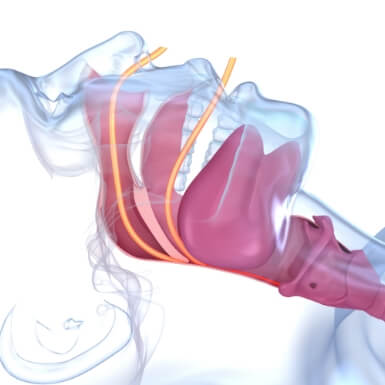
There are two main types of sleep apnea: obstructive sleep apnea (OSA) and central sleep apnea (CSA). With OSA, the airway is blocked off due to soft tissue in the throat and mouth relaxing and collapsing together, creating a barrier. CSA is much less common and stems from a neurological problem where the brain doesn’t send the body the right signal to breathe during sleep.
Learn More About Obstructive Sleep Apnea
Learn More About Central Sleep Apnea
Risk Factors for Sleep Apnea
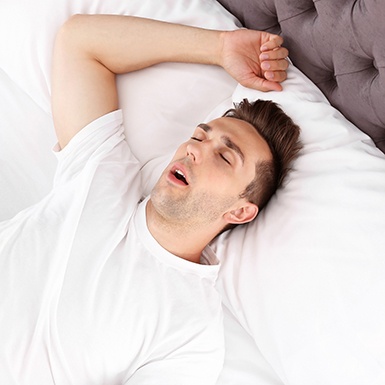
Anyone can develop sleep apnea, but certain individuals are at a higher risk than others. For example, many people with sleep apnea are also overweight. Other risk factors include being male, having an unusually narrow airway, using alcohol or cigarettes, and nasal congestion. You may also be more likely to experience sleep apnea if someone else in your family has it. If you’re at a higher risk of suffering from sleep apnea, it’s especially important to be aware of the warning signs of the disorder.
What are the Symptoms of Sleep Apnea?
The most common symptoms that sleep apnea sufferers tend to experience include:
- Loud, persistent snoring
- Daytime exhaustion despite getting 7-9 hours of sleep
- Waking up in the middle of the night gasping or choking
- Falling asleep in the middle of the day or while driving
- Sore throats or headaches in the morning
- Irritability/mood swings
- Brain fog/memory issues
- Rapid weight gain/trouble losing weight
- Teeth grinding/clenching
- Sexual dysfunction
- Hypertension
Do You Have Jaw or Bite Problems? It May be Sleep Apnea
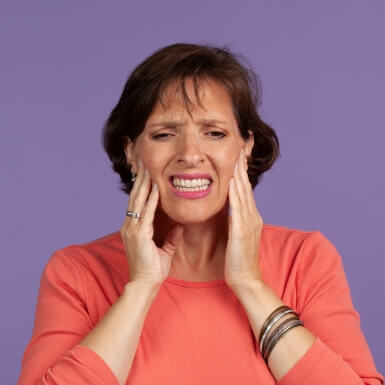
Two conditions that are deeply connected are sleep apnea and temporomandibular joint disorder (TMD), which refers to an imbalance in the bite that can lead to pain. As the body forces itself to restart breathing, this can cause the jaw and teeth to clench together, straining the facial muscles. On the other hand, a misaligned or underdeveloped bite can make the upper airway become obstructed more easily. It can often be a “chicken or the egg” situation.
How is Sleep Apnea Diagnosed?
Even if someone presents with all of the symptoms listed above, the only definitive way to diagnose sleep apnea is for the patient to take a sleep test. During this, they spend the night connected to a machine that monitors their breathing, heart rate, and movement. The results are then evaluated by a certified sleep doctor who can determine whether or not the person has sleep apnea.
Learn More About Diagnosing Sleep Apnea
How Do You Treat Sleep Apnea?
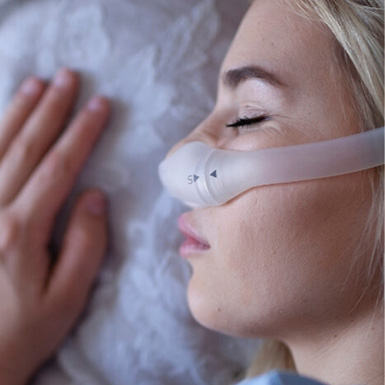
There are four main treatment options for sleep apnea . The most popular is CPAP (continuous positive airway pressure) therapy in which a patient basically sleeps with an air pump attached to their face, and corrective surgery is possible (but rarely necessary) as well. Another involves lifestyle changes, including losing weight and quitting drinking/smoking, all of which contribute to the prevalence of sleep apnea.
At our specialty dental office, we offer a more conservative alternative with oral appliance therapy using the Vivos DNA appliance. It looks like a retainer and is only worn to bed, and it has been proven to dramatically reduce and even stop sleep apnea symptoms for some patients.
Learn More About the Vivos DNA Appliance
Snoring: A Dangerous Annoyance
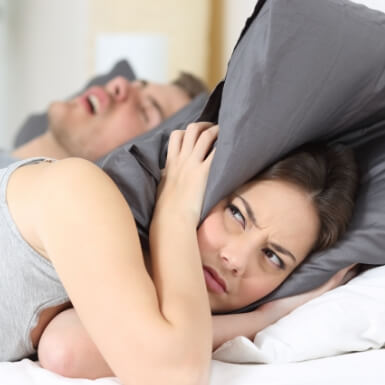
Snoring is often the most obvious indicator of sleep apnea, but not everyone who snores has the condition. However, if a person frequently snores and is often tired throughout the day and experiences some of the other symptoms we listed above, then it is definitely in their interest to take our sleep assessment to see how likely they are to have sleep apnea.
Does My Insurance Cover Sleep Apnea Treatment?

Yes, most insurance plans do cover sleep apnea care, whether a person uses CPAP therapy or an oral appliance. What’s important to point out is that even though an oral appliance is provided by a dentist (Dr. Saba), it will be covered by medical insurance because it is addressing a medical issue, not a dental one.
Confused? You aren’t alone! But we can help you understand all these details so you can get the treatment you need as affordably as possible.
Understanding the Cost of Sleep Apnea Treatment

Our team wants to ensure that you don’t feel stressed about paying for the cost of sleep apnea treatment. With all of the tests involved, it’s understandable that you’ll want to know as much as possible about the overall price of your care before moving forward. The good news is that we’ll walk you through your financial options in detail throughout the process, including insurance and alternative payment plans to help minimize your out-of-pocket expenses.
Does My Insurance Cover the Cost of Sleep Apnea Treatment?

Yes, most insurance plans do cover sleep apnea care, whether a person uses CPAP therapy or an oral appliance. What’s important to point out is that even though an oral appliance is provided by a dentist (Dr. Saba), it will be covered by medical insurance because it addresses a medical issue, not a dental one. Confused? You aren’t alone! Our team can help you understand all these details so you can get the treatment you need as affordably as possible.
Factors That Affect the Cost of Sleep Apnea Treatment

When determining the overall price of your sleep apnea treatment, our team will consider a variety of factors that can impact the amount, including:
- The kind of sleep apnea treatment you go for (oral appliance therapy, CPAP, Bi-PAP, etc.)
- The severity of your snoring/sleep apnea disorder
- The amount you’re willing to pay out of pocket
During your consultation, we’ll review these details thoroughly so that you fully understand what to expect. This way you won’t be surprised whenever it comes time to pay the bill.
Treat Your Sleep Apnea Now to Improve Your Health
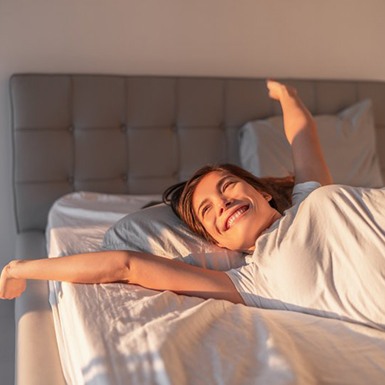
One of the most important ways to save money on costly health-related complications that can get worse from unchecked sleep apnea is to seek treatment early on. Neglecting to treat your sleep disorder now can end up allowing obstruction to your airways to continue, significantly raising your risk of strokes, cardiovascular disease, heart attacks, diabetes, depression, and more. Instead of struggling with costly chronic health conditions later on, it’s best to address your sleep apnea symptoms right away. Not only will you help your physical and mental well-being, but you’ll also be able to save more in the long run.
Making Sleep Apnea Treatment More Affordable

Even if you currently don’t have insurance, it doesn’t mean you’ll automatically have to pay everything out of pocket. Our team is partnered with third-party financiers like CareCredit, Sunbit, and Lending Club that can help split up the entire cost of your treatment into smaller, monthly, little-to-zero-interest installments. This way you can receive the care you need while working within your budget!
Sleep Apnea Frequently Asked Questions

Most people have heard of sleep apnea, and they may even know someone who has the condition, but a true understanding of how it works is quite rare. Given how seriously it can negatively impact someone’s health, knowing more can give a person the motivation they need to seek out treatment or suggest a loved one do the same. If you have any questions about sleep apnea, you are always welcome to call our team and ask. Below, we’ve gone ahead and answered some of the most popular ones we receive.
Does snoring automatically mean someone has sleep apnea?
While loud, chronic snoring is one of the most common and telltale signs of sleep apnea, not everyone who snores has the condition. Some people with sleep apnea don’t snore at all! That’s why a sleep test is necessary to make a diagnosis. If a person snores and feels exhausted all the time no matter how much they sleep, then they should definitely schedule a sleep screening.
How can a dentist help with sleep apnea?
With obstructive sleep apnea (OSA), which is the most common form of sleep apnea, all of the physical symptoms occur in the mouth and upper airway. Dentists are experts when it comes to examining and treating these parts of the body, so they are naturally able to assist those struggling with sleep apnea. Sleep dentists like Dr. Saba have also completed specialized training on how to provide custom mouthguards that prevent the airway from becoming blocked throughout the night.
Will sleep apnea go away on its own?
Unfortunately, it is extremely rare for sleep apnea to simply stop on its own. This is because it often stems from narrow airway anatomy that won’t change over time, or it is connected to excess weight/obesity. While weight loss can help, the time it takes to lose enough so that someone’s sleep apnea stops can take a long time, which can allow the condition to cause harm. That’s why professional intervention is always recommended for sleep apnea patients, as it can help them start getting the essential rest they need right away. Once that is set, long-term solutions that require more of a time investment become much more viable.
Can sleep apnea be fatal?
Sleep apnea itself isn’t fatal, but it dramatically raises a person’s risk for things that are extremely fatal. Firstly, the chances of someone getting into a motor vehicle accident increase by 300% when they have untreated sleep apnea, which is actually worse than driving while intoxicated. Plus, sleep apnea causes hypertension, which is a leading risk factor for heart attack and stroke. When it comes to treating this condition, it’s not just about preventing daily exhaustion—it can literally add years to your life!
Can I Diagnose Sleep Apnea on My Own?
After learning about the symptoms that are often linked to sleep apnea, you may think that’s sufficient information to diagnose the problem on your own. However, the symptoms by themselves aren’t enough to definitively say that you are suffering from sleep-disordered breathing; they could have other explanations. The only way to know for sure is to have a sleep test performed. A trained professional can evaluate the results of your test and determine whether you truly have sleep apnea, thus allowing you to pursue the right kind of treatment.
Will Oral Appliance Therapy Make CPAP Therapy Unnecessary?
Some patients who are unhappy using a CPAP machine wish to switch to an oral appliance. In some cases, this may be a viable option; an oral appliance by itself can be an effective way to manage mild or moderate sleep apnea symptoms. On the other hand, if your sleep disorder is too severe, oral appliance therapy may not give you the results that you want. Our sleep specialists are here to help you determine the treatment option that’s truly best for you.
How Should I Clean My Sleep Apnea Oral Appliance?
If you were given an oral appliance to manage your sleep apnea symptoms, you need to make an effort to keep it clean and free of harmful bacteria. You can make this part of your morning routine; when you take your appliance out, be sure to brush it thoroughly before rinsing it off. Remember to use a soft-bristled toothbrush since one with hard bristles might damage the appliance. After you’ve finished brushing, put the appliance back in its case; do not simply leave it lying on the bathroom counter.
Who is Most at Risk for Sleep Apnea?
The truth of the matter is that anyone could potentially develop sleep apnea. However, some groups have more of a risk than others. Notably, people who are overweight are more likely to experience sleep apnea episodes thanks to an increased presence of fat deposits that can block the upper airway. Sleep apnea also has a higher chance of affecting:
- Women who are pregnant or postmenopausal.
- People with naturally narrow airways.
- People who are in their 60s and 70s.
- People who have diabetes.
- People who have a family history of sleep apnea.
If you fall under any of these categories, then you should be extra vigilant about keeping an eye out for potential sleep apnea symptoms.
Will My Sleep Apnea Go Away If I Lose Weight?
If excess weight is contributing to your sleep apnea, losing said weight could help make your symptoms less severe by reducing the presence of fatty tissue that might cause an airway obstruction. Of course, sometimes sleep apnea will persist even after weight loss. To know for sure whether your sleep disorder is still present, you would need to make arrangements to have another sleep test performed.
